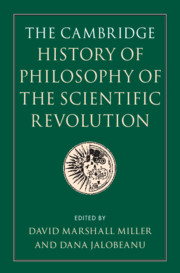Book contents
- The Cambridge History of Philosophy of the Scientific Revolution
- The Cambridge History of Philosophy of the Scientific Revolution
- Copyright page
- Contents
- Tables and Figures
- Contributors
- Preface
- Introduction The Disciplinary Revolutions of Early Modern Philosophy and Science
- Part I The Disciplines
- 1 The Uses of Ancient Philosophy
- 2 Novatores
- 3 Renaissance Aristotelianism(s)
- 4 What To Do With the Mechanical Philosophy?
- 5 The Later Sects: Cartesians, Gassendists, Leibnizians, and Newtonians
- 6 Confessionalization and Natural Philosophy
- 7 The Rise of a Public Science? Women and Natural Philosophy in the Early Modern Period
- Part II Disciplinary Activities
- Part III Problems and Controversies
- Bibliography
- Index
3 - Renaissance Aristotelianism(s)
from Part I - The Disciplines
Published online by Cambridge University Press: 14 January 2022
- The Cambridge History of Philosophy of the Scientific Revolution
- The Cambridge History of Philosophy of the Scientific Revolution
- Copyright page
- Contents
- Tables and Figures
- Contributors
- Preface
- Introduction The Disciplinary Revolutions of Early Modern Philosophy and Science
- Part I The Disciplines
- 1 The Uses of Ancient Philosophy
- 2 Novatores
- 3 Renaissance Aristotelianism(s)
- 4 What To Do With the Mechanical Philosophy?
- 5 The Later Sects: Cartesians, Gassendists, Leibnizians, and Newtonians
- 6 Confessionalization and Natural Philosophy
- 7 The Rise of a Public Science? Women and Natural Philosophy in the Early Modern Period
- Part II Disciplinary Activities
- Part III Problems and Controversies
- Bibliography
- Index
Summary
This chapter focuses on the intellectual activities of Aristotelian philosophers within the late-Renaissance and early modern university context. It shows that Scholastic Aristotelianism constituted a varied, dynamic, and long-lasting philosophical tradition rooted in, but not limited to, problems arising from Aristotle’s texts. Late Scholastic solutions did not always pose obstacles to new sciences and matter theories, but also anticipated them. The chapter examines key variants of Aristotelianism in the context of their institutional settings and curricula. This provides an opportunity to re-assess radical Aristotelianism (e.g., Averroism), the late-Scholastic revival (e.g., the Jesuit Ratio Studiorum and Suárez) and Protestant Scholasticism. Developing Charles Schmitt’s thesis that there were many different, even conflicting, Aristotelianisms, the chapter argues that some so-called “anti-Aristotelians,” whom the moderns conscripted as allies to their cause, are better understood as working within a broader Aristotelian framework. Identifying the shared Aristotelian problem space of both more orthodox and controversial philosophers of the period affords a better understanding of both the conflicts themselves and the extensive debts that later developments bore to this tradition.
Keywords
- Type
- Chapter
- Information
- Publisher: Cambridge University PressPrint publication year: 2022

